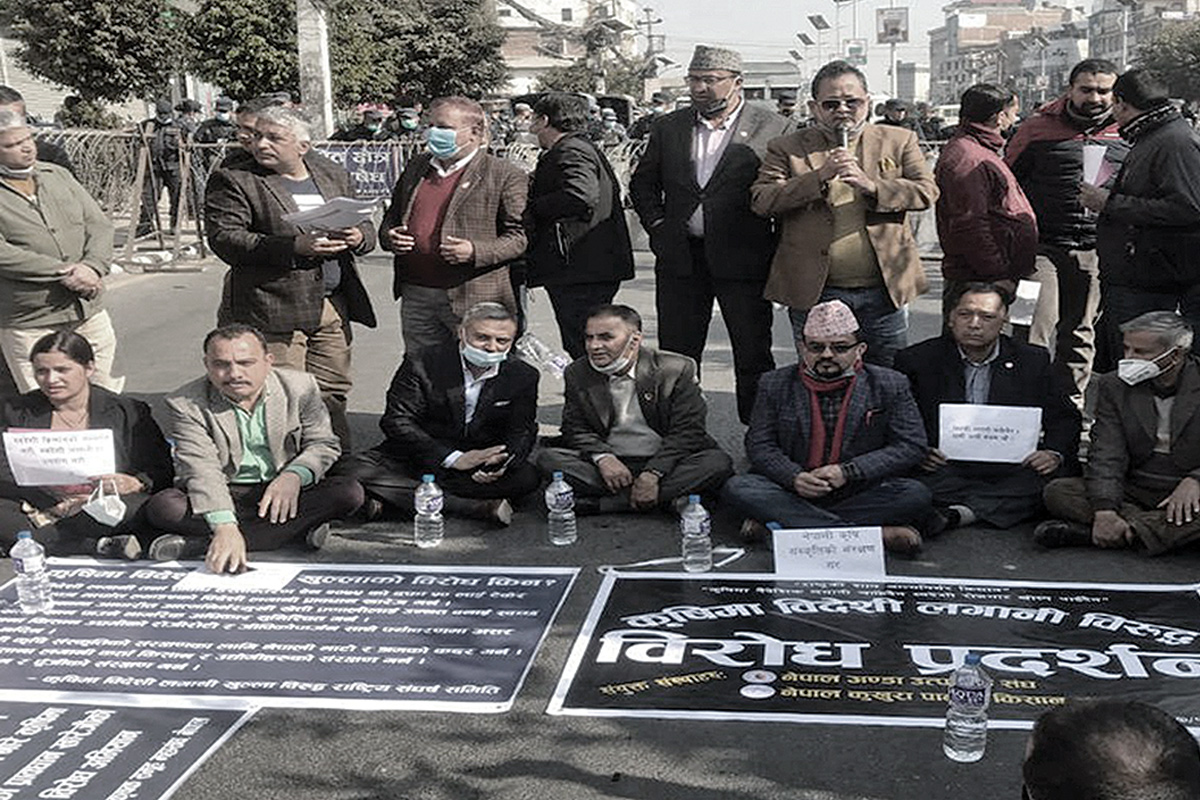
The government’s decision of welcoming foreign direct investment (FDI) into the agriculture sector reeled into controversy as protests emereged and the decision was challenged in court. The government has decided to open up FDI in a few subsectors of agriculture such as livestock, fisheries, beekeeping, fruit and vegetable production, oilseeds and lentil farming and dairy provided that 75% of the total production must be exported. Contrary to the provisions of the Foreign Investment and Technology Transfer Act 2019 which restricts FDI in primary production of the agriculture sector, the Cabinet meeting decided to open up these sectors to welcome foreign investment. Since the gazette notice was published on January 4, 2021, different associations of farmers are agitated and have asked that the government withdraw the decision. Farmers are distressed that with their old farming techniques and limited access to capital, the competition from FDI would kill their income as it would engage highly skilled labour, new techniques and advantages of scale.
Instead, they have urged the government to equip farmers with skills and technology that would make them more competitive. Against this backdrop, the private sector umbrella bodies - Federation of Nepalese Chambers of Commerce and Industry (FNCCI), Nepal Chamber of Commerce (NCC) and Confederation of Nepalese Industries (CNI) - have jointly opposed the idea of welcoming FDI into primary agriculture products. They have stated that this decision was taken without any consultation with the private sector. “The government does not even maintain a degree of courtesy of consulting the private sector. The government failed to understand the position of the private sector and this has raised doubts on the government’s intention,’ said Keshav Acharya, an economist, “If there had been consultations, things might have been clearer.” Most importantly, it is the duty of the government to consult with stakeholders before taking decisions that could directly or indirectly impact them, which is the basis for a fair and transparent decision, stated Acharya. The private sector joint statement argues, “We should allow foreign investment that boosts export of the country utilising local raw materials for production through bringing cutting-edge technologies and skill sets at different levels of operation.” The private sector umbrella bodies have underlined that the income from primary agriculture products is the lifeblood for farmers.
However, the government has dismissed the claims of the private sector stating that FDI in the aforementioned sector is being opened up to minimise trade deficit and raise agricultural yield through modern technical know-how and skills. Baikuntha Aryal, Secretary at the Ministry of Industry, Commerce and Supplies said that the production from FDI companies will be predominantly exported as there is condition of 75% export which automatically means that these companies will not exploit the domestic market. “This will neither distort the domestic market nor affect the farmers,” said Aryal, adding “Farmers can reap advantages selling their raw products to the companies set up by foreign investors, they will get skills and technologies for production once they are integrated in the value chain of such companies and fetch better price for their produce.” Speaking at the Delegated Management and Government Assurance Committee of the National Assembly, Aryal said that the government has opened up foreign investment not in small and medium enterprises in aforesaid sectors. It requires at least Rs 500 million investment and mandatory export provision of 75%. He further clarified that it will not adversely affect farmers or SMEs. The government will take into account protection and security of domestic investment. Earlier, the government had issued license to some dairies like Sujal Dairy of Pokhara and Chitwan Milk with protection provision in which the government will not provide license for another competitor in that certain catchment area to ensure that the dairies will not face scarcity of raw material. Dairy firms were at the forefront of the protest as they believe that the government is going to welcome Amul Dairy, India. Amul has repeatedly tried to enter Nepal, however the FDI law was a major barrier thus far, according to Saroj Pandey, owner of S.K. Dairy Industries of Nepalgunj, “The Nepali market is insignificant for a dairy giant like Amul, however if Amul enters the Nepali market, it may gain in popularity and other domestic industries will be affected significantly.” The government has alleged that Nepal’s private sector is scared to compete even with 25% of their production. However, the private sector stands firm in its stance. Dangote Cement is a case in point which could not enter the Nepali market due to anti-lobby by the private sector. Nepal’s private sector is often alleged for cartelling against foreign investment as they fear that modern technology and economies of scale could dampen their investment.
However, for the country, foreign investment in the production sector is a must as the growth of the production sector is stagnant, requires intensive investment, modern technologies and skill-sets to boost production, will create employment, exports and finally expand the economy. The government’s decision of opening up FDI in agriculture was challenged at the Court within days of the notice being issued. The bench of Supreme Court Justice Manoj Sharma issued a short-term interim order to prevent the decision from coming into force. The Court has summoned the government to present before the court the rationale behind opening up FDI in agriculture following the first round of hearing on writ petition filed by Advocate Punya Prasad Khatiwada in the third week of January. Total FDI flow in 2019-20 stands at Rs. 194.82 billion. Currently, annual average FDI flow is Rs. 15 billion. Nepal receives FDI that is less than 0.5% of the country’s GDP which is far below the average FDI flow in developing economies. The government has been repeatedly criticised for its inability to improve the investment climate to attract FDI into the country. Nepal’s FDI law promotes investments in trade sector, companies that generate employment and promote exports with a minimum investment threshold of Rs 50 million.






